


Schadenfreude runs wide and deep against Apple, Inc. The company's phoenix-like cycle of rebirth from ashes has left the tech world's analysts and columnists looking foolish on so many occasions that many seem to hope the company would just vanish and leave the industry without any surprises or difficult mysteries to decipher.
After all, it’s much easier to predict the innovation Microsoft will deliver: every new PC will have Windows on it, end of story. It's both easy and safe to congratulate Bill Gates for always eventually delivering upon his promises to at some point match the existing products of rivals. 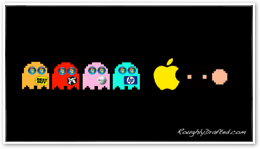

It might take ten years for Microsoft to catch up, but with its mega-billions in the bank and its tenacious grip of market control, it has long seemed foolish to suggest that any competitor could unseat the Redmond Empire on any playing field.
Apple’s Problematic Disruption.
That makes Apple a painful thorn in the side of the professional adorers of Microsoft. If Apple can take back the bully's lunch money, then presumably so can others. That upsets the established order of the blandly predictable tech world, forcing columnists to give more thought to the ideas they publish.
These writers clearly do not want to expend much thought; they want to publish sensationalist, formulaic fluff that attracts the zombie hordes of Digg, at least a few of whom will trigger their ad-supported links and keep them in business. Witness the PC World brouhaha over the “Why we hate” fluff pieces commissioned for Digg.
For the few beneficiaries of the comfortable business model of writing what people want to hear--rather than what they need to hear--change is a threat. Once Microsoft's rivals become established strongly enough, no amount of FUD will help to overturn progress back into the favor of Microsoft.
That means they have to hit hard and fast with their opinionalysis to kill off any threats to Microsoft's hegemony before any take root. Unfortunately for them, they have not managed to stop Apple's recent ascent to a position of direct competition against Microsoft in consumer electronics, particularly with the iPod family.
This has only prompted them to try attacking harder. Ignoring the well-known details of history, analysts are quick to compare today's Apple with the company as it existed in the mid 80s or mid 90s, and suggest that the new Apple is about to stumble into a black hole. 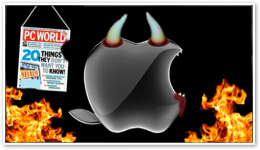

Is it? Consider the historical facts analysts are avoiding in their attack on Apple's latest ventures.
Apple's Rags to Riches to Rags...
Apple's darling rise in the late 70s and early 80s with the success of the Apple II fell precipitously after a series of desperate product introductions missed their market. The Apple III, the Lisa, and the original Mac all failed as competitive products.
The Apple III was a poorly constructed, stopgap product that couldn't run much existing Apple II software and didn't really offer a significant technology jump of its own. The Lisa was prohibitively expensive for even professional and business users, and the original Mac was too resource limited and lacked obvious practical applications for its brilliant new interface.
It appeared that Apple--the company that introduced personal computing to the masses--had hoist itself on its own petard while trying to blow up the conventional DOS world with its fully graphical computing environment.
Surely, the analysts liked to claim, Apple couldn't deliver the Mac as a useful platform; even if it did, plenty of other companies would similarly introduce a CPU with a mouse and windows and leave Apple in a crowded market with an undistinguished product.
No hope!
to Riches...
So many of Apple's peers were either struggling in the market or already dead--from Atari to Commodore to Osborne--that it seemed safe to dismiss Apple and its graphical new toy Mac.
Just as analysts began mocking the company however, Apple turned things around and was able to deliver the Mac platform as clearly superior to other DOS alternatives, particularly for creative professional users who demanded a higher quality computing environment than DOS or Windows would provide for another decade.
to Rags...
The tune changed back to adoring praise of the leadership of John Sculley in the late 80s, only to be met again with a series of early 90s failures that included the Newton, the Mac Performa consumer line, and Apple's failure to ship Pink, Taligent, or Copland.
Sculley had set Apple aimlessly adrift, and CEOs Michael Spindler and later Gil Amelio did little to correct the profoundly ingrained institutional problems that built up a reputation for Apple as being a hopelessly beleaguered company. Meanwhile, the Windows PC was becoming entrenched as the standard in computing, and Microsoft had appropriated much of Apple's Mac innovations into Windows.
Clearly, there was no reason to cheerlead for such a loser of a company. It became an unwritten rule that any mention of Apple Computer required attaching the word beleaguered. The hatchets came out in full force.
to Riches.
In 1997, under the new leadership of Steve Jobs, Apple began rapidly cleaning up its messy past and putting its house back in order, but columnists continued to feel safe in deriding the company's fortunes as hopeless.
The success of the iMac, a new expansion into new creative markets with Final Cut Pro and Logic, a consumer friendly portfolio of software paired with new Macs, and the delivery of Mac OS X as an embarrassment to Microsoft's Windows all helped to make Apple-trashing columnists again look foolish.
Since 2001, Apple has:
-
•delivered regular, significant new software updates to Mac OS X;
-
•turned a forgotten project within Macromedia into an industry leader in film and video post production;
-
•reclaimed its role in delivering the state of the art in digital media creation and playback with QuickTime;
-
•become the world's leader in online music and video distribution.
Finding a New Attack Vector.
Windows flacks moved on to attack the company using other manufacture-facts: ridiculing the company's Switcher campaign as a failure because it didn’t immediately unseat Microsoft's desktop monopoly, and holding up Apple's share of the entire world's PC production as proof that the Mac was not something anyone should talk about.
Surely a platform with 2% of the entire PC market couldn't survive for even a few more years. Of course they were wrong again, in part because Apple's tiny share of the entire PC market worldwide was also a significant portion of the domestic installed base, particularly in key markets such as education, creative workers, scitech, and home consumers.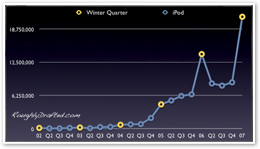

In the last three years, Apple has more than doubled its production and sales of Mac computers, and simply swallowed up the music player market whole with the iPod.
There is One More Thing...
After seamlessly migrating the Mac platform to mainstream Intel processors last year, the company is now branching out into two major new initiatives: mobiles with the iPhone and the living room with Apple TV.
Many analysts have been hell-bent to discredit Apple's attempts to expand into these new areas, particularly since they directly take aim at initiatives from Microsoft that haven't done much: WinCE / Windows Mobile and Windows Media Center. Pretending not to know better, they liken Apple, Inc. to its former self from decades ago.
The next two articles will look at Apple TV and the iPhone in comparison to what analysts are saying about them, and point out why both will do more to change the tech landscape than anything from anyone else. Have a favorite article bemoaning the imminent failure of Apple TV or the iPhone? Send it in!
Like reading RoughlyDrafted? Share articles with your friends, link from your blog, and subscribe to my podcast!
Did I miss any details?
Next Articles:
This Series

Haloscan Q107
Analysts' Schadenfreude Über Apple
Friday, June 1, 2007

Ad



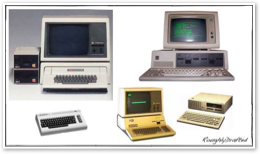


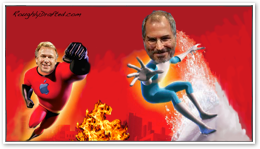


 Bookmark on Del.icio.us
Bookmark on Del.icio.us Discuss on Reddit
Discuss on Reddit Critically review on NewsTrust
Critically review on NewsTrust Forward to Friends
Forward to Friends
 Get RSS Feed
Get RSS Feed Download RSS Widget
Download RSS Widget





